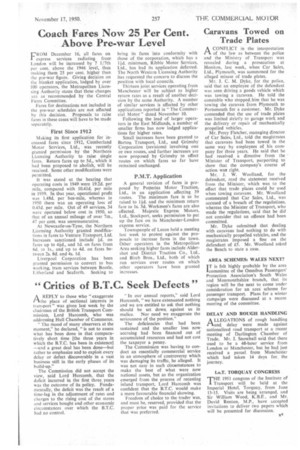"Critics of B.T.C. Seek Defects"
Page 39

If you've noticed an error in this article please click here to report it so we can fix it.
AREPLY to those who "exaggerate he place of sectional interests in transport" was given last week by the chairman of the British Transport Commission, Lord Hurcomb, who was addressing Hull Chamber of Commerce.
The mood of many observers at the moment," he declared, "is not to assess what has been done in that comparatively short time [the three years in which the B.T.C. has been in existence] —and a great deal has been done—but rather to emphasize and to exploit every delay or defect discoverable in a vast business still in the early phases of its build-up."
The Commission did not accept the view, said Lord Hurcomb, that the deficit incurred in the first three years was the outcome of its policy. Fundamentally, the deficit was the result of a time-lag in the adjustment of rates and charges to the rising cost of the stores and services bought and other economic circumstances over which the B.T.C. had no control. "In our annual reports," said Lord 14urcomb, "we have extenuated nothing and we are entitled to ask that nothing should be set down, against us in malice. Nor need we exaggerate the seriousness of the position."
The deficiencies that had been sustained and the smaller loss now accruing had been financed out of accumulated resources and had not cost the taxpayer a penny.
The Commission was having to conduct an essentially commercial service in an atmosphere of controversy which was damaging its traffic, he alleged. It was not easy in such circumstances to make the hest of what were now national assets, but as the organization emerged from the process of recasting inland transport, Lord Hurcomb was confident that the B.T.C. would make a more favourable financial showing.
Freedom of choice to the trader was, and must be, reserved, provided that the proper price was paid for the service that was preferred.




























































































